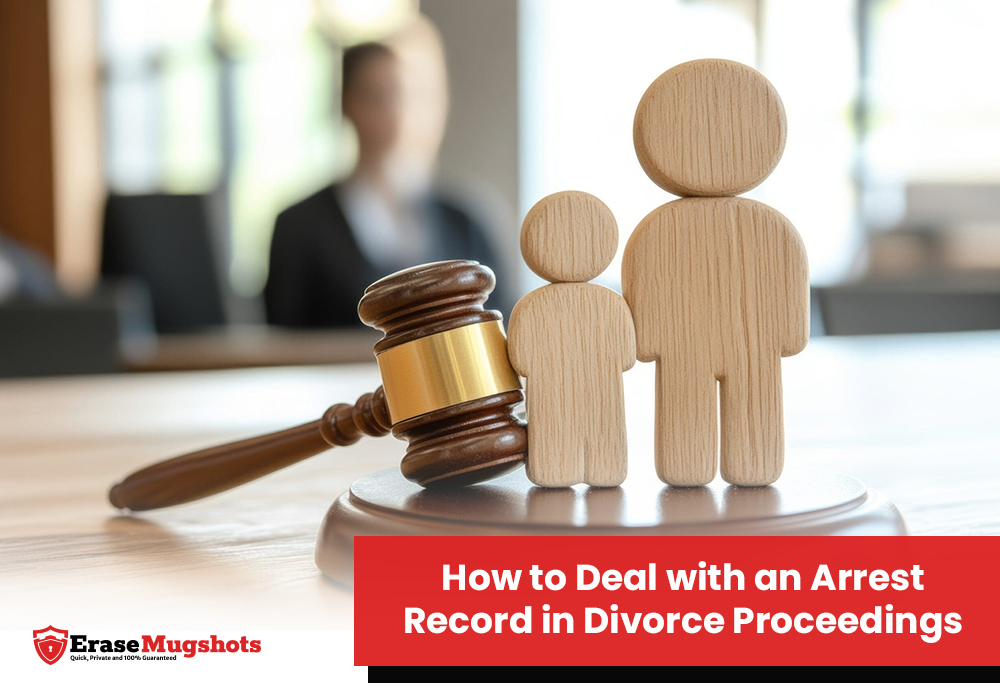100% Satisfaction Guaranteed
We offer a total mugshot removal solution to remove your mugshot and arrest details from the internet once and for all.

Table of Contents
Divorce is already a complicated and emotionally charged process. An arrest record can add another layer of legal complexity, significantly impacting various aspects of the divorce, including child custody, spousal support, and property division. Understanding how to address your arrest record and its potential effects is crucial for protecting your rights and moving forward confidently in these family law matters.
An arrest record is a formal document that details an individual’s past encounters with law enforcement, including arrests, charges, and sometimes convictions. In Los Angeles, individuals can obtain this record for personal reference or to address legal challenges during a divorce. The implications of an arrest record can be significant, especially regarding family law matters like child custody and divorce settlements.
Having an arrest record can affect a divorce in several ways. It may raise concerns regarding child safety, spousal support, or the equitable division of marital assets. Understanding these impacts and how to navigate them can help ease the stress of the divorce process.
An arrest record can complicate divorce proceedings by introducing legal challenges that heighten emotional stress for everyone involved. Issues related to child custody and spousal support can become particularly contentious, especially if a spouse’s criminal record raises concerns about the safety of children or the financial stability of one spouse.
In such cases, the best course of action is to seek professional legal advice. An experienced attorney can help you understand your rights and work with you to address these issues in a way that minimizes emotional turmoil and protects your interests.
Yes, an arrest record can significantly impact child custody arrangements. Family courts prioritize the best interests of the child, and a history of criminal activity—especially crimes involving violence or substance abuse—may raise concerns about a parent’s ability to provide a safe environment.
When deciding on custody, judges will look closely at:
Courts also consider the presence of support systems like rehabilitation programs or therapy. If the parent with the arrest record has taken steps toward rehabilitation, this may be seen as a positive factor when determining custody.
An arrest record can also impact spousal support or alimony decisions. Judges consider the financial implications of criminal behavior, including legal fees, loss of income, or incarceration, which could affect a spouse’s ability to meet support obligations.
For example, if the arrested spouse faces jail time or has incurred significant legal costs, their ability to pay spousal support may be reduced. Additionally, serious criminal charges—such as violent crimes—can influence how the court views the spouse’s financial situation and emotional capacity to meet support obligations.
In some cases, false arrest records or accusations may arise during divorce proceedings. To protect yourself, it’s essential to maintain thorough documentation of your activities and whereabouts.
Record-keeping can be vital in proving your innocence if false accusations arise. This might include:
Staying out of legal trouble is critical to preventing complications in divorce proceedings. Avoid engaging in suspicious or illegal activities that could raise red flags during the divorce process.
Dismissal of Charges: If charges are dismissed, it can positively influence divorce, making it easier to negotiate child custody or asset division. A clean slate can help shift the focus back to more relevant issues, like the child’s well-being or financial stability.
Reduced Charges or Plea Bargain: In some cases, an arrest may lead to reduced charges or a plea bargain, which can lessen the legal consequences. This may improve your standing in the divorce and make negotiations regarding custody or support more manageable.
Conviction and Sentencing: If a conviction results from the arrest, it can have serious consequences for both custody arrangements and spousal support. Convictions related to violence or substance abuse may affect visitation rights, and financial penalties could impact support obligations.
If you’re navigating divorce in Los Angeles with an arrest record, seeking legal guidance from a trusted family law attorney is essential. By addressing both the legal and emotional aspects of the situation, you can better protect your rights, understand your options, and work towards a resolution that supports both your future and that of your children.
Taking steps to address your arrest record, whether through expungement, defense strategies, or documentation, can help you move forward during one of life’s most challenging times. With the right support, you can navigate this process with clarity and confidence.
We offer a total mugshot removal solution to remove your mugshot and arrest details from the internet once and for all.